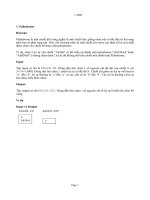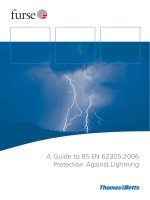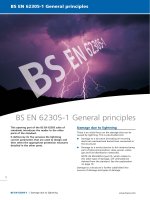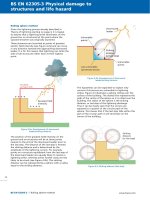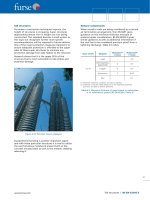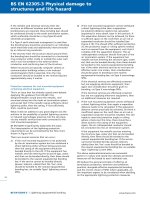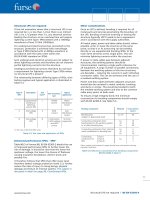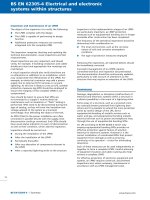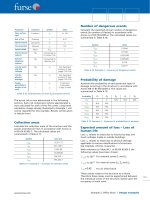Bsi bs en 02155 2 1993 (2000)
Bạn đang xem bản rút gọn của tài liệu. Xem và tải ngay bản đầy đủ của tài liệu tại đây (229.36 KB, 10 trang )
BRITISH STANDARD AEROSPACE SERIES
Test methods for
transparent materials
for aircraft glazing —
Part 2: Determination of water
absorption
The European Standard EN 2155-2:1993 has the status of a
British Standard
UDC 629.73.023.26:620.1:535.695.52
BS EN
2155-2:1993
BS EN 2155-2:1993
Cooperating organizations
The European Committee for Standardization (CEN), under whose supervision
this European Standard was prepared, comprises the national standards
organizations of the following countries:
Austria
Belgium
Denmark
Finland
France
Germany
Greece
Iceland
Ireland
Italy
Luxembourg
Netherlands
Norway
Portugal
Spain
Sweden
Switzerland
United Kingdom
This British Standard, having
been prepared under the
direction of the Aerospace
Standards Policy Committee,
was published under the
authority of the Standards
Board and comes into effect on
15 March 1993
© BSI 01-2000
The following BSI references
relate to the work on this
standard:
Committee reference ACE/62
Draft for comment 91/74926 DC
ISBN 0 580 22063 X
Oesterreichisches Normungsinstitut
Institut belge de normalisation
Dansk Standardiseringsraad
Suomen Standardisoimisliito, r.y.
Association franỗaise de normalisation
Deutsches Institut für Normung e.V.
Hellenic Organization for Standardization
Technological Institute of Iceland
National Standards Authority of Ireland
Ente Nazionale Italiano di Unificazione
Inspection du Travail et des Mines
Nederlands Normalisatie-instituut
Norges Standardiseringsforbund
Instituto Portugs da Qualidade
Asociación Espola de Normalización y Certificación
Standardiseringskommissionen i Sverige
Association suisse de normalisation
British Standards Institution
Amendments issued since publication
Amd. No.
Date
Comments
BS EN 2155-2:1993
Contents
Cooperating organizations
National foreword
Foreword
1
Scope and field of application
2
Normative references
3
Purpose of the method
4
Apparatus
5
Specimens
6
Procedure
7
Calculation and expression of results
8
Test report
National annex NA (informative) Committees responsible
National annex NB (informative) Cross-references
© BSI 01-2000
Page
Inside front cover
ii
2
3
3
3
3
3
3
3
3
Inside back cover
Inside back cover
i
BS EN 2155-2:1993
National foreword
This British Standard has been prepared under the direction of the Aerospace
Standards Policy Committee and is the English language version of
EN 2155-2:1993, Aerospace series — Test methods for transparent materials for
aircraft glazing — Part 2 Determination of water absorption, published by the
European Committee for Standardization (CEN).
EN 2155-2 was produced as a result of international discussion in which the UK
took an active part.
A British Standard does not purport to include all the necessary provisions of a
contract. Users of British Standards are responsible for their correct application.
Compliance with a British Standard does not of itself confer immunity
from legal obligations.
Summary of pages
This document comprises a front cover, an inside front cover, pages i and ii,
the EN title page, pages 2 to 4, an inside back cover and a back cover.
This standard has been updated (see copyright date) and may have had
amendments incorporated. This will be indicated in the amendment table on the
inside front cover.
ii
© BSI 01-2000
EN 2155-2
EUROPEAN STANDARD
NORME EUROPÉENNE
EUROPÄISCHE NORM
January 1993
UDC 629.73.023.26:620.1:535.695.52
Descriptors: Aircraft industry, glazing, transparent plastics, glass, water, absorption tests
English version
Aerospace series
Test methods for transparent materials for aircraft glazing
Part 2: Determination of water absorption
Série aérospatiale — Méthodes d’essais pour
matériaux transparents pour vitrages
aéronautiques
Partie 2: Détermination de l’absorption d’eau
Luft- und Raumfahrt — Prüfverfahren für
transparente Werkstoffe zur Verglasung von
Luftfahrzeugen
Teil 2: Bestimmung der Wasseraufnahme
This European Standard was approved by CEN on 1993-01-04. CEN members
are bound to comply with the CEN/CENELEC Internal Regulations which
stipulate the conditions for giving this European Standard the status of a
national standard without any alteration.
Up-to-date lists and bibliographical references concerning such national
standards may be obtained on application to the Central Secretariat or to any
CEN member.
This European Standard exists in three official versions (English, French,
German). A version in any other language made by translation under the
responsibility of a CEN member into its own language and notified to the
Central Secretariat has the same status as the official versions.
CEN members are the national standards bodies of Austria, Belgium,
Denmark, Finland, France, Germany, Greece, Iceland, Ireland, Italy,
Luxembourg, Netherlands, Norway, Portugal, Spain, Sweden, Switzerland and
United Kingdom.
CEN
European Committee for Standardization
Comité Européen de Normalisation
Europäisches Komitee für Normung
Central Secretariat: rue de Stassart 36, B-1050 Brussels
© 1993 Copyright reserved to CEN members
Ref. No. EN 2155-2:1993 E
EN 2155-2:1993
Foreword
This European Standard has been prepared by the
European Association of Aerospace Manufacturers
(AECMA).
After inquiries and votes carried out in accordance
with the rules of this Association, this standard has
successively received the approval of the National
Associations and the Official Services of the member
countries of AECMA, prior to its presentation to
CEN.
This European Standard shall be given the status of
a national standard, either by publication of an
identical text or by endorsement, at the latest by
July 1993, and conflicting national standards shall
be withdrawn at the latest by July 1993.
According to the CEN/CENELEC Internal
Regulations, the following countries are bound to
implement this European Standard:
Austria, Belgium, Denmark, Finland, France,
Germany, Greece, Iceland, Ireland, Italy,
Luxembourg, Netherlands, Norway, Portugal,
Spain, Sweden, Switzerland and United Kingdom.
2
© BSI 01-2000
EN 2155-2:1993
1 Scope and field of application
This standard specifies the method used for the
determination of the water absorption by means of
immersion in conformance with ISO 62, method 1,
applicable for transparent materials. In addition, it
specifies the particular conditions for aircraft
glazing.
2 Normative references
This European Standard incorporates by dated or
undated reference, provisions from other
publications. These normative references are cited
at the appropriate places in the text and the
publications are listed hereafter. For dated
references, subsequent amendments to or revisions
of any of these publications apply to this European
Standard only when incorporated in it by
amendment or revision. For undated references the
latest edition of the publication referred to applies.
ISO 62:1980, Plastics — Determination of water
absorption.
3 Purpose of the method
Indication of the behaviour of materials in certain
moist conditions. The values do not represent the
maximum amount of water that can be absorbed.
The absorption of water can affect the dimensions
and the electrical, thermal and mechanical
properties.
4 Apparatus
4.1 Balance with an accuracy of 1 mg.
4.2 Oven which can be maintained at a temperature
of (50 ± 2) °C.
4.3 Vessel for distilled water maintained
at (23 ± 0,5) °C.
4.4 Desiccator
5 Specimens
6 Procedure
Three specimens are dried in an oven for (24 ± 1) h
at a temperature of (50 ± 2) °C, cooled in a
desiccator and each is weighed to the nearest 1 mg
(mass m1 ).
They are then placed in distilled water maintained
at a temperature of (23 ± 0,5) °C.
Precautions are taken to prevent specimens from
making contact over any substantial area, either
with one another or with the container.
After (24 ± 1) h they are taken from the water and
all surface water removed with a clean dry cloth or
with filter paper.
The specimens are weighed to the nearest 1 mg
again within one minute of taking them from the
water (mass m 2).
NOTE Specimens of different materials are not to be placed into
the same container of distilled water.
7 Calculation and expression of results
The water absorption of a specimen (m2 – m1 ) is
expressed in milligrammes. The value recorded for
the water absorption of the material under test is
the arithmetic mean of the values obtained on the
specimens.
The measured thicknesses of specimens and the
masses m1 and m 2 are to be recorded.
8 Test report
The test report shall include the following
information:
— reference to this standard,
— the average water absorption in milligrams
and individual values,
— the average thickness of specimens in
millimetres and individual values,
— the average initial mass of specimens in grams
and individual values.
The specimen shall be (50 ± 1) mm square with a
thickness of (3,0 ± 0,2) mm machined from the sheet
under test.
Cut or machined surfaces shall be smooth and shall
not show any burring.
© BSI 01-2000
3
4
blank
BS EN 2155-2:1993
National annex NA (informative)
Committees responsible
The United Kingdom participation in the preparation of this European Standard was entrusted by the
Aerospace Standards Policy Committee (ACE/-) to Technical Committee ACE/62 upon which the following
bodies were represented:
British Plastics Federation
Ministry of Defence
Society of British Aerospace Companies Limited
National annex NB (informative)
Cross-references
Publication referred to
ISO 62:1980
Corresponding British Standard
BS 2782 Methods of testing plastics
Methods 430A to 430D:1983 Determination of water absorption at 23 °C.
Determination of water absorption at 23 ° C with allowance for water-soluble
matter. Determination of boiling water absorption. Determination of boiling water
with allowance for water-soluble matter
© BSI 01-2000
BS EN
2155-2:1993
BSI — British Standards Institution
BSI is the independent national body responsible for preparing
British Standards. It presents the UK view on standards in Europe and at the
international level. It is incorporated by Royal Charter.
Revisions
British Standards are updated by amendment or revision. Users of
British Standards should make sure that they possess the latest amendments or
editions.
It is the constant aim of BSI to improve the quality of our products and services.
We would be grateful if anyone finding an inaccuracy or ambiguity while using
this British Standard would inform the Secretary of the technical committee
responsible, the identity of which can be found on the inside front cover.
Tel: 020 8996 9000. Fax: 020 8996 7400.
BSI offers members an individual updating service called PLUS which ensures
that subscribers automatically receive the latest editions of standards.
Buying standards
Orders for all BSI, international and foreign standards publications should be
addressed to Customer Services. Tel: 020 8996 9001. Fax: 020 8996 7001.
In response to orders for international standards, it is BSI policy to supply the
BSI implementation of those that have been published as British Standards,
unless otherwise requested.
Information on standards
BSI provides a wide range of information on national, European and
international standards through its Library and its Technical Help to Exporters
Service. Various BSI electronic information services are also available which give
details on all its products and services. Contact the Information Centre.
Tel: 020 8996 7111. Fax: 020 8996 7048.
Subscribing members of BSI are kept up to date with standards developments
and receive substantial discounts on the purchase price of standards. For details
of these and other benefits contact Membership Administration.
Tel: 020 8996 7002. Fax: 020 8996 7001.
Copyright
Copyright subsists in all BSI publications. BSI also holds the copyright, in the
UK, of the publications of the international standardization bodies. Except as
permitted under the Copyright, Designs and Patents Act 1988 no extract may be
reproduced, stored in a retrieval system or transmitted in any form or by any
means – electronic, photocopying, recording or otherwise – without prior written
permission from BSI.
This does not preclude the free use, in the course of implementing the standard,
of necessary details such as symbols, and size, type or grade designations. If these
details are to be used for any other purpose than implementation then the prior
written permission of BSI must be obtained.
BSI
389 Chiswick High Road
London
W4 4AL
If permission is granted, the terms may include royalty payments or a licensing
agreement. Details and advice can be obtained from the Copyright Manager.
Tel: 020 8996 7070.
